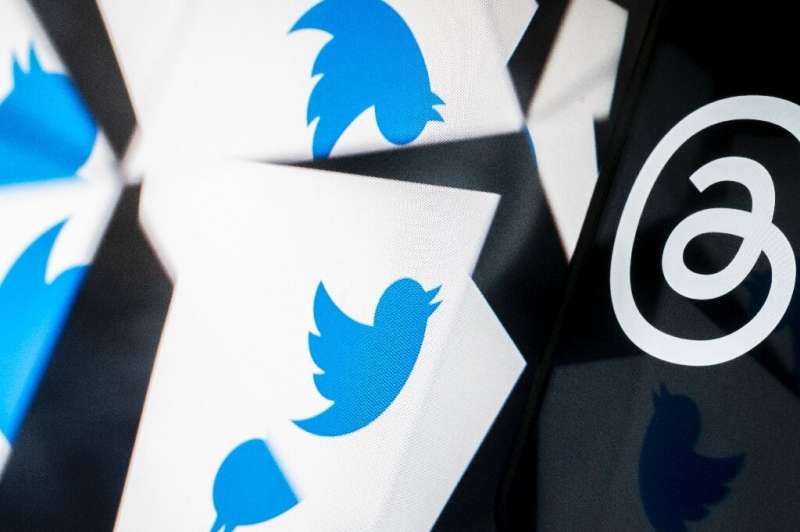
Since Elon Musk took over Twitter eight months ago, users irked by the platform’s new regime have vowed to move their online presence elsewhere, though the habit has proved hard to break.
Now Facebook owner Meta is jumping into the ring, launching its own contender to dethrone Twitter as the go-to website for the media, officials and celebrities.
Here is a breakdown of Twitter’s wannabe alternatives.
Zuckerberg’s Threads
Described as Instagram’s “text-based conversation app,” Meta’s Threads will certainly spice up the rivalry between Twitter’s Musk and Meta supremo Mark Zuckerberg.
Threads looks a lot like a pared-back version of Twitter, with users able to like, comment on and share posts as well as use their same profile names as on Instagram. Unlike Twitter, there are no hashtags.
A plan to make Threads interoperable with other Twitter rivals such as Mastodon is on hold for now, but not abandoned.
Bluesky, Dorsey’s Twitter clone
Bluesky was created by Twitter’s co-founder Jack Dorsey and is very popular in Silicon Valley, leaving those in the know scrambling to secure an invite to join the app that is still at the testing phase.
The upstart told CNBC it experienced record-high traffic Saturday after Musk said Twitter would temporarily limit the number of posts users can read per day.
Bluesky looks and feels like Twitter as its backers want users from the Musk-owned site to feel at home.
Bluesky was actually created as a Twitter side project in 2019 as a way to think about a decentralized version of the platform where users—and not the company— are more in control of personal data and content moderation.
It also uses something called the AT Protocol that allows people to maintain their identities across multiple platforms.
Mastodon, the anti-Twitter
Unknown to the general public, Mastodon saw its popularity explode when Musk took over Twitter, though it is well off the pace of Twitter’s roughly 200 million monthly users.
Created in 2016 by the German developer Eugen Rochko, the site is also a decentralized social network without advertising where preserving privacy is sacrosanct.
In practice, Mastodon like Twitter is based on postings of small messages, but each new user must sign up to an independently-run server and there are thousands of them. In theory, users can interact freely across the Mastodon servers, but this can be complicated and unreliable.
Many new users complain about the platform’s less than intuitive interface, underlining the difficulty of creating an account and the poor response times unlike sites run by the tech giants.
Content moderation is also a big question mark as it is left to the sole discretion of server administrators, with some refusing access to others, disrupting the experience.
Substack Notes
In an act of vengeance, Musk earlier this year briefly blocked links and search responses to Substack, the site that helps writers monetize their work, after the site launched Substack Notes.
Notes, much like Twitter, allows writers to post short pieces of content such as links, images and quotes and helps guide users to paid content.
Musk reversed his retribution decision but has since heavily promoted ways Twitter will help users make money.
Substack Notes has faced some flak as it is not yet sure how it will manage content moderation but says it will feel less pressure to cook up viral content since its revenue is based on taking a cut from writer pages and not page views and advertising.
Niche platforms
A few other start-ups are also attracting attention, especially ones that cater to a specific audience.
Right-wing sites such as Gab or Truth Social, the platform launched by former US president Donald Trump, positioned themselves as conservative alternatives to Twitter long before it was taken over by Musk.
Discord is a platform used especially by gamers that allows users to create invite-only chat rooms where participants can hold discussions on shared interests.
The site entered the headlines when a 21-year-old American national guardsman named Jack Teixeira allegedly used the site to share a trove of sensitive US documents involving state secrets to his chat group.
© 2023 AFP
Citation:
Twitter rivals pile up with Meta’s launch of Threads (2023, July 6)
retrieved 6 July 2023
from https://techxplore.com/news/2023-07-twitter-rivals-pile-meta-threads.html
This document is subject to copyright. Apart from any fair dealing for the purpose of private study or research, no
part may be reproduced without the written permission. The content is provided for information purposes only.
Stay connected with us on social media platform for instant update click here to join our Twitter, & Facebook
We are now on Telegram. Click here to join our channel (@TechiUpdate) and stay updated with the latest Technology headlines.
For all the latest Technology News Click Here
For the latest news and updates, follow us on Google News.
